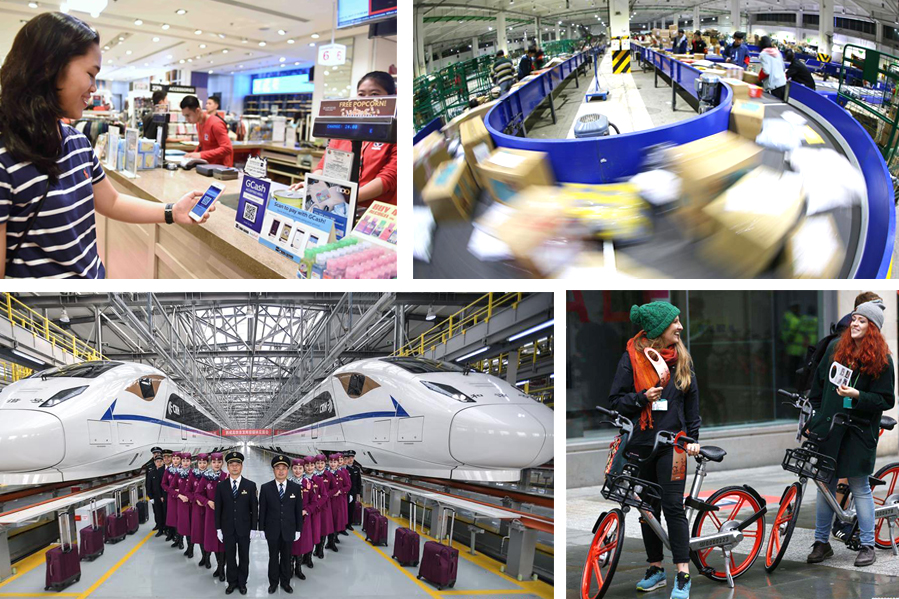Conference opens new chapter for economy

High-speed rail, mobile payment, bike sharing and online shopping have been dubbed the “New Four Great Inventions of China,” indicating the country’s economic structure is being upgraded through innovation. (PHOTO: XINHUA)
Economists applauded the recently concluded Central Economic Work Conference, saying that the statement “the Chinese economy has also entered a new era” marks the start of a new journey for the nation’s development.
The tone-setting annual economic meeting, which was held behind closed doors from Dec. 18 to 20, reviewed the economic work of the past five years and set policy priorities for 2018.
According to the conference statement, Xi Jinping’s Thought on Socialist Economy with Chinese Characteristics for a New Era has taken shape.
“Xi Jinping’s Thought on Socialist Economy with Chinese Characteristics for a New Era features innovation, coordination, green development, openness and sharing,” noted Zhang Ping, a research fellow from the Institute of Economics at the Chinese Academy of Social Sciences.
Under the guidance of Xi’s development philosophy, the Chinese economy has grown at an annual rate of 7.1 percent on average since the 18th CPC National Congress, achieving fruitful results, Zhang said.
Xiao Jincheng, vice-chairman of the Chinese Association for Regional Economy, said that the development philosophy is based on developmental experiences, lessons and trends of China and foreign countries, as well as prominent domestic contradictions and problems.
Innovation aims to transform the driver of growth, Xiao said. High-speed rail, mobile payment, bike sharing and online shopping have been dubbed the “New Four Great Inventions of China,” indicating the country’s economic structure is being upgraded through innovation.
Coordination is needed to rectify economic imbalances. Coordination helps to solve the principal contradiction between unbalanced, inadequate development and the people’s ever-growing demand for a better life, and to realize coordinated urban-rural and regional development, Xiao said.
Green development focuses on maintaining harmony between man and nature, Xiao said. In recent years, the environment has noticeably changed for the better, as unprecedented efforts have been devoted to promoting ecological progress and marked results have been achieved in controlling air, water and soil pollution.
Openness emphasizes all-round two-way opening up with links running eastward and westward, across land and over sea, Xiao said. The “Belt and Road” initiative will boost opening up on all fronts, not only in eastern coastal areas, but also central and western inland regions.
And shared development values social fairness and equity to share the fruits of reform and opening with all Chinese people, Xiao added.
The historic achievements in China’s economic development have provided an important material foundtion for reform in other fields, said Sun Jiuwen, a professor of economics at Renmin University of China.
“With the economy shifting from the high-speed to high-quality growth stage, speed is no longer at the core of development,” Zhang said. Since the 18th Party congress, the Chinese economy has entered the new normal, which entails pursuing progress while ensuring stability in macro control.
“The underlying principle of pursuing progress while ensuring stability is crucial to state governance,” Xiao said, adding that prudent macro economic control policies have contributed to the steady growth of the economy since the 18th CPC National Congress.
In the past five years, China has vigorously advanced supply-side structural reform and other macro control measures against the backdrop of the new normal, thus maintaining relatively high growth.
Zhang predicted that if the economy continues to grow at a rate of 6.3 percent or faster from 2018 to 2020, the goal of doubling the GDP by 2020 will be attained. There is much room for that, judging from the current situation, Zhang said.
In other words, under the principle of pursuing growth while ensuring stability, the Chinese economy will have larger space for adjustment in the next three years and leave adequate leeway for reform, Zhang added.
Containing risks and actively seeking incentives for the transition from high-speed to high-quality growth are critical to pursuing growth while ensuring stability, Zhang added.
Commenting on the Chinese economy, Roger Stough, former president of the Regional Science Association International and a professor from George Mason University in the United States, pointed out that China went from a totally undeveloped country to a major developing nation in one generation.
The remarkable achievements China has made are undoubtedly due to the ruling party’s reasonable planning and down-to-earth implementation, Stough said.
China has provided valuable experience for other countries and regions, Stough said, adding that the China-proposed “Belt and Road” initiative has broken new ground in opening up, offering developing opportunities to the world.

 PRINT
PRINT CLOSE
CLOSE